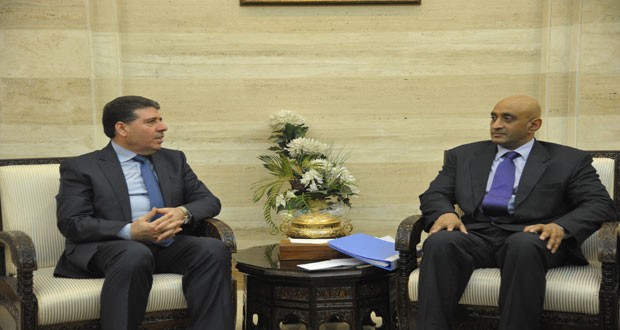DAMASCUS,(ST)_ Prime Minister Dr. Wael al-Halaqi stressed in a meeting yesterday with Chairman of West Asia and North Africa department at the Indian Foreign Ministry Sandeep Kumar the Syrian government’s desire to expand the areas of economic and industrial cooperation with friendly countries, especially India through a wider range of joint work ventures.
The prime minister called on Indian businessmen and companies to contribute to the establishment of investment, development and service projects in Syria, to contribute in Syria’s reconstruction, and to cooperate in the areas of food securing food, pharmaceutical supplies, rehabilitation of factories and laboratories, hospitals, and electricity power plants.
He underlined the importance of cooperation “of all countries in the world with Syria to fight terrorism and stop supporting it financially, militarily and logistically.”
For his part, Kumar said that the Indian government is keen to expand areas of cooperation with Syria, alleviate the suffering of the Syrian people and ensure requirements of their steadfastness against global terrorism.
The two sides discussed mechanisms to enhance cooperation and activating the signed agreements and cooperation opportunities in the areas of in electricity, medicine, transportation, agriculture, oil and gas.
Also discussed were the establishment of a laboratory for phosphate industry in Syria, rehabilitation of Hama’s Tishreen electrical generation station, and oil fields and the revival of Indian – Syrian Center for outstanding persons Damascus, in addition to the scientific, technical and cultural cooperation, and activating works of the Syrian – Indian Joint Commission.
Meantime, Deputy Premier and Minister of Foreign Affairs and Expatriates Walid al-Moallem discussed with Sandeep Kumar and members of the accompanying delegation, bilateral relations between the two countries and ways of enhancing them in various fields.
 Al-Moallem pointed out the systematic terror experienced by Syria and the importance of concerted regional and international efforts to maintain international peace and security and respect UN Security Council resolutions which call for fighting terrorism and draining its resources.
Al-Moallem pointed out the systematic terror experienced by Syria and the importance of concerted regional and international efforts to maintain international peace and security and respect UN Security Council resolutions which call for fighting terrorism and draining its resources.
For his part, Kumar stressed that India stands against outside interference in the affairs of other countries and considers that terrorism has become a source of concern for many countries and therefore international effort should be concentrated to combat it, noting India’s support to efforts for a political solution in Syria, so as to contribute in alleviating the suffering of the Syrian people and stabilizing the situation in Syria and the region.
Earlier, Deputy Foreign and Expatriates Minister Dr. Faisal Miqdad discussed with Kumar aspects of cooperation between the two countries, especially in the economic, cultural, scientific, health and reconstruction fields.
Dr. Miqdad expressed Syrian government appreciation for the Indian position that understands the criminal nature of what is happening in Syria by terrorist organizations, stressing the importance of strengthening relations between the two countries in all fields.
Kumar, on the other hand, pointed the Indian principled attitude towards Syria, which are based on supporting a political solution to the Syrian crisis, stressing his government’s endeavor to increase coordination and cooperation with the Syrian government and complete the implementation of the Indian projects in Syria.
T. Fateh

